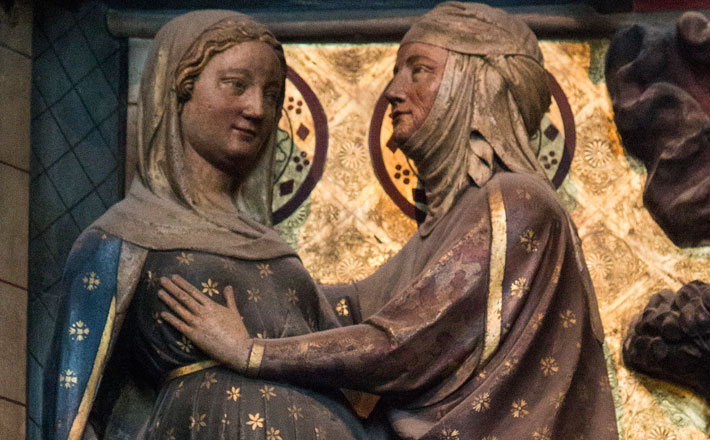Commentary on 2 Samuel 7:1-11, 16
Second Samuel 7:1-16 (cf. 1 Chronicles 17:1-14) is about the establishment of two houses: (1) the “house” (i.e., dynasty) of David, whose foundations are Yhwh’s promises and fidelity and (2) the “house” (i.e., temple) of Yhwh, which would eventually be built by David’s son, Solomon.
Houses, of course, bespeak permanence and presence. For Yhwh, this means that he will no longer dwell in a mobile “Tent and Tabernacle” (v. 6), but rather would be available to Israel in the form of a temple and its accompanying cultic functionaries.1 For David’s part, he is given a remarkable gift, an everlasting dynasty, to which he responds with an appropriately lavish display of worship (2 Samuel 7:18-29).
Yhwh’s speech to David (2 Samuel 7:4-17) recalls earlier acts of divine benevolence.
- “From the day that I brought the people of Israel out of Egypt” (v. 6)
- “I took you [David] from the pasture, from following the flock, to be ruler of My people Israel, and I have been with you wherever you went, and have cut down all your enemies before you.” (vv. 8-9)
In these verses, Yhwh’s acts on behalf of David are linked to Israel’s ancient confession that Yhwh is a gracious God who acted mightily on behalf of Israel when it was in slavery. David’s story parallels Israel’s: Like Israel, David was lifted from smallness into greatness.
The powerful memories related in 2 Samuel 7:6, 8-9 are interwoven with an abundance of new promises. Even as past promises come into reality, new ones for a new day are given:
- “I will give you [David] great renown like that of the greatest men on earth” (v. 9; cf. Genesis 12:2)
- “I will establish a home for My people Israel and will plant them firm, so that they shall dwell secure and shall tremble no more. Evil men shall not oppress them any more as in the past” (v. 10)
- “I will give you safety from all your enemies.” (v. 11)
- “The LORD declares to you that He, the LORD, will establish a house for you” (v. 11)
- “When your days are done and you lie with your fathers, I will raise up your offspring after you, one of your own issue, and I will establish his kingship” (v. 12).
- “He shall build a house for My name, and I will establish his royal throne forever” (v. 13)
- “I will be a father to him, and he shall be a son to Me. When he does wrong, I will chastise him with the rod of men and the affliction of mortals” (v. 14)
- “but I will never withdraw My favor from him as I withdrew it from Saul, whom I removed to make room for you” (v. 15)
- “Your house and your kingship shall ever be secure before you; your throne shall be established forever” (v. 16)
Renown, security, an everlasting dynasty, children to perpetuate his name, unconditional favor, and an unshakeable throne. These are the profound and generous promises given to the House of David and to the Israelites over whom he rules. They are utterly unconditional, containing only a warning that, when one of David’s sons does wrong, Yhwh will discipline him at the hand of human agents (2 Samuel 7:14). The Davidic covenant leaves room for judgment, but that judgment is relativized by the scope of Yhwh’s promise. Individual sons of David may come under threat, but the dynasty itself, so the promise claims, never will.
And it is precisely this push and pull, ebb and flow between promise and judgment that marks much of the rest of Israel’s royal history (Samuel-Kings). The important promises given to David accompanied the southern kingdom of Judah throughout the monarchic period, which came to a disastrous end in 586 BCE (see 2 Kings 24-25). In the time leading up to that fateful year, Yhwh’s unconditional promises toward David functioned as a buffer against Yhwh’s judgment.2
By and large the history of the monarchy in the book of Kings is a history of disobedience to the first commandment. But embedded within the constant drumbeat of apostasy and judgment are the promises given to David and his dynasty. These promises qualify, buffer, restrain, and stave off Yhwh’s judgment, with varying results. One first sees the promises at work in this way in 1 Kings 11:12-13. The text claims that Solomon’s love for foreign women turned his heart away from Yhwh and toward other gods (1 Kings 11:1-10). Yhwh responds with judgment: “I will surely tear the kingdom from you and give it to your servant” (1 Kings 11:11). But then, following quickly on the heels of this declaration of judgment, Yhwh’s commitments to David emerge as a qualifying force:
Yet for the sake of your father David I will not do it in your lifetime; I will tear it out of the hand of your son. I will not, however, tear away the entire kingdom; I will give one tribe to your son, for the sake of my servant David and for the sake of Jerusalem, which I have chosen. (1 Kings 11:12-13; cf. 32, 34-36, 39)
Not only would Solomon be spared from seeing the judgment, it would not result in a total loss: “I will give one tribe to your son, for the sake of my servant David.”
Shortly thereafter, the prophet Abijah encounters Jeroboam (the future ruler of the Northern Kingdom of Israel) and gives him this oracle:
See, I am about to tear the kingdom from the hand of Solomon, and will give you ten tribes. One tribe will remain his, for the sake of my servant David and for the sake of Jerusalem, the city that I have chosen out of all the tribes of Israel (1 Kings 11:31-32).
Judgment is delayed or diminished because of promises previously made to David and his dynasty. Elsewhere in Kings, the promises to David function similarly to stave off or otherwise qualify divine judgment (see 1 Kings 15:4-5; 2 Kings 8:19). Yhwh’s judgment against David’s dynasty is neither total nor final, because Yhwh is faithful to David, whose house Yhwh has promised to maintain. Divine patience with the Davidic dynasty, then, is due in no small part to Yhwh’s commitment to the promises made in 2 Samuel 7.
The promises given to David in 2 Samuel 7 have a significant impact on Judah’s monarchy well beyond David’s own lifetime. Why these promises were ultimately unable to stave off the Babylonian onslaught of the early 6th century remains one of the most persistent theological problems in the Hebrew Bible. For Christians, the emergence of Christ — son of David — in the first century is a manifestation of Yhwh’s ongoing commitment to the dynasty of the son of Jesse.
Notes:
1 All translations come from the Jewish Publication Society’s Tanakh translation.
2 This point was made powerfully in Gerhard von Rad, “The Deuteronomic Theology of History in Kings,” in From Genesis to Chronicles: Explorations in Old Testament Theology (Minneapolis: Fortress Press, 2005), 154-66.


December 21, 2014